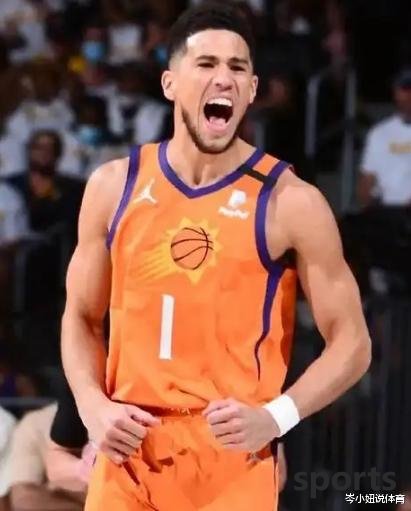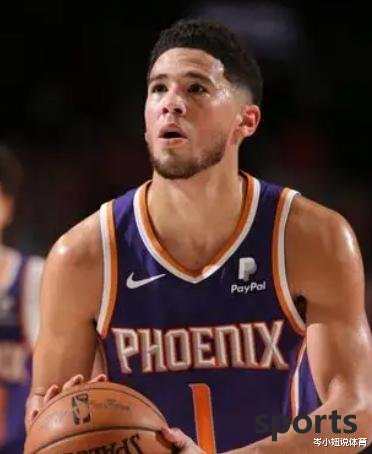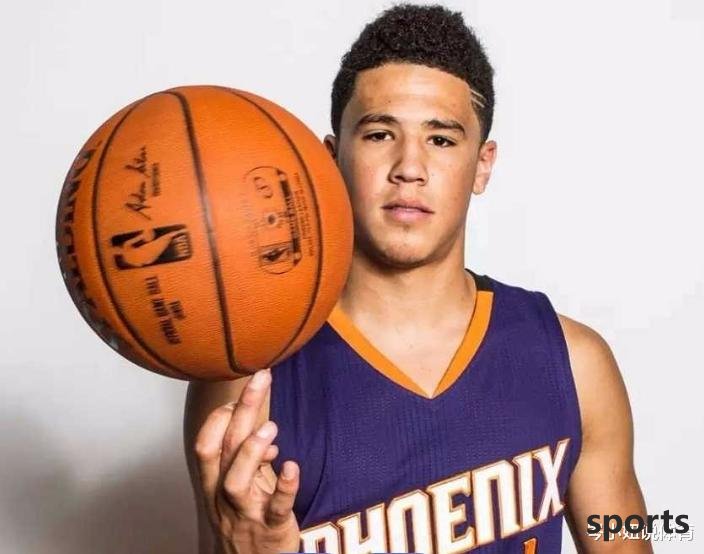289 Sports > Basketball > The Suns give up Durant, Bill, Paul and others, and even if they are bad, they will keep Booker
The Suns give up Durant, Bill, Paul and others, and even if they are bad, they will keep Booker
On July 17, it is not uncommon for a team to completely rebuild around a certain star in the long history of the NBA, but it has been aroused widespread discussion like the Phoenix Suns, who would rather give up top stars such as Kevin Durant, Bradley Bill and Chris Paul than to keep Devin Booker's determination to keep Devin Booker with all his might. Behind this decision, it not only concerns the adjustment of the team's tactical system, but also reflects the long-term trust of the Suns management in Booker as a "significant figure" and a team-building philosophy that surpasses short-term achievements.

### **Strategic shift: From "quick championship competition" to "long-termism" **
The Suns' operations in recent years have been labeled as "short for quick success". Durant will come to trade in 2023, Bill will be introduced in 2024, and Paul signed earlier, the team is trying to replicate the "Big Three" mode to strive for the championship. However, this way of piled up the stars did not bring the expected results: he was eliminated by the Nuggets in the second round of the 2024 playoffs, and even fell to the brink of the playoffs in 2025 due to injuries and chemical problems. Management clearly realized that the window period for relying on senior stars (Durant 36 and Paul 39) has been closed, and Bill's long-term large contract ($220 million for the remaining four years) has become a heavy burden on salary space. At this time, complete reconstruction became a rational choice, and Booker - who was only 28 years old, at the peak of his life and had been at the Sun for 10 years - naturally became the cornerstone of reconstruction.

### **Book's irreplaceability: loyalty, ability and business value**
The Sun's persistence in Booker is not blind. First of all, he is one of the rare representatives of "one person, one city" in the league. Since joining as the No. 13 pick in 2015, Booker has grown from an "empty group leader" to an All-Star guard who averaged 27+5+6 per game, and led the Suns to the finals in 2021. This experience of growing up with the team gives him a unique sense of authority in the locker room and a sense of fan identity. Secondly, Booker's offensive skills are comprehensive and durable: unsolvable medium distance, improved organizational capabilities year by year, and key ball stability (top five hits at critical moments in 2025), making him an ideal candidate for the core of the team. Finally, Booker’s commercial value cannot be ignored. As a symbol of Arizona Sports, his jersey sales have always ranked among the top ten in the league, and his home box office appeal far exceeds foreign stars such as Durant.

### **Logistics of bad performance: short-term pain and future chips**
Actively giving up the combat power means that the Suns may face a 1-2 seasons of bad performance, but this strategy implies multiple considerations. On the one hand, after cleaning up the contracts of Durant (trading to the Rockets for the first round pick), Bill (submitting the draft pick to the Pistons) and Paul (buyout), the Suns will free up nearly $60 million in salary space in 2026, creating conditions for introducing young talents or another superstar. On the other hand, potential high-pick draft picks in the 2025-26 season (such as super newcomers such as Flagg and Bailey) may accelerate the reconstruction process. James Jones, president of Suns basketball operations, once publicly stated: "What we need is not short-term success, but competitiveness that lasts for ten years." This idea coincides with the reconstruction path of the Thunder, Spurs and other teams.
### **Controversy and Risk: Survival Problems in the Single-Core Era**
However, the risks of building a single-core team around Booker are equally obvious. The modern NBA emphasizes the collaboration of multiple stars. Without exception, the championship teams in the past decade have at least two top scorers (such as Jokic Murray, Antetokounmpo Holiday, and Curry Durant). Although Booker is strong, his lack of top-level defense and organizational capabilities may limit the team's ceiling. In addition, long-term loss culture may devour the star's patience - Booker did not publicly promise to renew his contract during the 2025 offseason. If his record does not improve in the next two years, the pressure on his application for a deal will increase dramatically. The Suns' strategy to deal with this is to create a "Book-friendly" lineup: signing 3D wings (such as signing Cameron Johnson in the free market in 2025), cultivating young insiders other than Ayton, and optimizing the offensive system through the assistant coach team.
### **Symbolism of iconic characters**
From a deeper perspective, the choice of the Sun reflects the survival wisdom of the team in the small-scale market. In an era of frequent superstar flow, players like Booker who have both strength and loyalty are scarce resources. Antetokounmpo of the Bucks and Jokic of the Nuggets prove that the team building model with local stars as the core can not only improve performance, but also enhance community identity. Suns owner Matt Ishbiya's speech is intriguing: "Devin is our Dirk Nowitzki." - This implies that the team is willing to provide Booker with long-term patience similar to the Mavericks' treatment of Nothing, even if he cannot win the championship in the short term.
### **Conclusion: A future picture of a big bet**
The Suns' decision is a game about "star culture" and "fast team success". Leaving Booker means accepting a gradual reconstruction, and its success depends on three variables: whether Booker can evolve into an MVP-level leader, whether the management draft vision is accurate, and the operating space of the future free market. If successful, the Suns may replicate the Warriors' trajectory from the bottom of the fish to the dynasty; if they fail, they may fall into a dilemma similar to the Wizards (long-term success in building a team around Bill). In any case, this choice has provided a new discussion sample for the NBA's team building strategy: in an era when superstars are grouping together, trusting a "person" with all their might be a romantic and pragmatic resistance.
Related Posts
So what if he averages 4+1+1 per game? The main defender is retired, and the 21-year-old No. 1 player is sitting on the bench. He has a chance to make a comeback!
BasketballNot long ago, this season's NBA preseason games have ended. The Rockets, who have been crazy about signings this summer, did not have any surprises. In all four games, they won them all easily. And the scary thing is that in these games, the tea...
moreXia Ji: Caleb Martin and Buwe have participated in training and are expected to appear in the opening game
BasketballHupu News, October 19 Today, according to TA Mavericks reporter Christian Clark, forward Caleb Martin and defender Brandon Williams have participated in training and are expected to appear in the opening game. In addition, Daniel Gafford conducted n...
moreFamous reporter: James and his business partners have withdrawn from the new $5 billion international basketball league plan
BasketballOn October 19, ESPN reporter Brian Windhorst wrote an article reporting on the business plan of the Middle East consortium in the international basketball market. Windhorst mentioned in the article the new international basketball league plan that J...
more
Hot Posts
- Last season, averaged 9.7 points and 2.2 rebounds! Jersey Reporter: Coffey wore No. 17 jersey in the Bucks
- 18 years of the showdown in the league to looking up to the new king, the legend continues
- Durant himself never thought he could enjoy super high treatment in his life, but he came to the right place!
- The park championship has no value? American News: The Lakers have better psychological adjustment and beat many stars all the way
- As strong as Jokic is only the No. 41 pick in the second round in 2014. Who are the top five in the same class? Tanhua became an MVP
- Well-known reporter: The Lakers center may get a contract of 5.2 million, but he may still stay with the Lakers
- The logo of the NBA tough guy: Kobe s Achilles tendon, Rose s knees, Green s heart
- Top Ten Wicked People in NBA History: Dream Chasing Green is on the list, and there is no dispute!
- A wise man will make a mistake. James counts the 20-year trend of the league, but he has not counted these 5 things
- Three-point shooting percentage is 48.2%, top 3D with an average of 14+6 per game, and only 33 million yuan. Do you regret it, Celtics?
Recent Posts
-
US media is among the top five stars applying for trading. Who do the Rockets want?
-
Another famous reporter: Brogden may also join the Warriors, but he has to wait for Kumingga
-
A 14-point victory! It quietly became a popular champion, no one is optimistic about you, but you are going to win the championship
-
James: Ci Shiping is one of the best defenders I have ever faced. He is as strong as a bull when he starts.
-
Everyone criticizes Hu Mingxuan? Why does Guidance Guo Shiqiang still use him? The answer has been revealed!
-
Famous Trainer: The first NBA player who trusts me is JR. I slept on his sofa all year long
-
Scott: My Lake defeated the Celtics by $3.1 billion. This is the most important thing
-
Goodbye, Kumingga! Hello, DeRozan?
-
Durant joins the Rockets! Revealing how the 7-team big deal was made
-
Knicks lost, Towns embraced Halliburton with 22+14+2